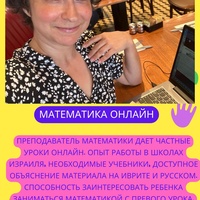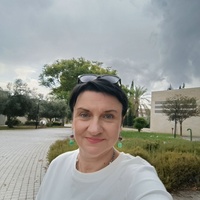Conversational Hebrew Online - Individual Lessons
Many people think that fluent Hebrew requires years of study. But I BECAME FLUENT IN HALF A YEAR, and the secret was that I moved away from traditional methods. **Hello everyone! My name is Nikita, I am 21, and I have been living in Israel for (or only) 3 years. When I arrived in the country, I completed Ulpan Aleph and could only say a few phrases in Hebrew. Every time I had to switch to Hebrew, I thought out the entire dialogue in advance - but in the end it came out as something like an uncertain mumble, where the words barely connected into sentences. A year later, I began serving in the army, where after three months it became much easier to speak. Words began to "float up" by themselves, and I almost did not think about grammar. Six months after the draft, I was already freely communicating with my fellow soldiers in Hebrew, and everyone was surprised at my rapid progress. Believe it or not, when people find out that I have only been in the country for three years, their reaction invariably makes me happy. “Really? I thought you had been living here for ten years!” or “You are not a repatriate, are you? I was sure you were born here!” – I hear phrases like these regularly. Now, after finishing my service, I speak with even more confidence – Hebrew has become an integral part of my daily life. And it can become one for you, too. Here's what I've learned from my experience and what I want to share with you:**
1. THE "CORE PHRASES" METHOD 🧶
The Russian language predisposes us to complex constructions that make it difficult to master Hebrew. Instead of looking for complex equivalents, start with simplified phrases. For example, instead of "There are many factors to consider when planning a trip, such as transportation, accommodation, and food," you can say "When planning a trip, you need to think about travel, accommodation, and food." In Hebrew, simple phrases with a limited set of words are often enough to express the desired idea. In fact, for everyday communication, you only need 300-600 words (calm down, it's not as much as it seems😄). By simplifying the language, you make it more accessible.
1. SPEECH AUTOMATION METHOD 🗣
My military service taught me that repetitive situations are the key to rapid learning. In the army, I encountered constantly repetitive tasks, and over time I began to feel more confident in Hebrew. It was difficult at first, but with each passing day the necessary phrases emerged faster. This is due to the way our memory works: words that we often repeat gradually move from short-term memory to long-term memory. The brain actively works to remember only those things that we use regularly, and by immersing ourselves in repetitive scenarios, we speed up the learning of the language. Eventually, you will begin to speak Hebrew without much effort, as the brain will “prompt” you with the necessary phrases automatically. Conclusion: Play out in your head dialogues that you might encounter in everyday life: what to say in a store, how to explain directions, how to go to the doctor. Using this method, you “transfer” words to long-term memory. The more often you repeat them, the easier they are to remember at the right moment. Each time you imagine possible situations, your vocabulary expands, and your speech becomes more confident. In Israel, everyday life is largely built on repetitive scenarios, and if you work through these moments in advance, your brain will prompt you with the necessary phrases.
3. ACTIVE BACKGROUND METHOD 🙆🏻♀️
When I first joined the army, I had a hard time communicating in Hebrew — I barely spoke, just listened. I was surrounded by the language 24/7, and over time it began to naturally “settle” in my head. When I returned to work on weekends and talked with colleagues, I felt more confident. And then, after a few months, everyone was surprised how quickly I started speaking, although just recently I could barely put words together into sentences.
Later, I realized that this was not an accident. Our brain is designed in such a way that when it hears a language around us, it begins to notice and assimilate its structure, even if we ourselves do not memorize words and rules. Gradually, the language “settles” in us, and the brain begins to produce the necessary words and phrases automatically. There are expressions that I never learned, but they came to me by themselves, thanks to constant immersion in the Hebrew-language environment. Sometimes I could just intuitively understand that someone was speaking incorrectly, although I myself had never learned the grammar of this expression. This is because the brain notices regularities and patterns, it itself remembers how “it sounds right”.
**My advice to those who want to speak Hebrew**: let the language be around you, even if it is just a background sound. Turn on the news, music, TV series, let Hebrew become part of your daily life. You do not need to understand every word - it is important that the brain gets used to the sound and intonation, to the natural rhythm of the language. Over time, it will help you itself, using the same patterns that you hear around you.
I have shared with you some of the methods that I use myself, and I hope that they will help you. But if you want to work on these and other strategies individually, I offer you online 1 on 1 classes. The first class is free and lasts 30 minutes. In it we will get to know each other, You will tell me about your experience of learning Hebrew, and also tell me about your wishes, which I will definitely take into account when drawing up a lesson plan. Then, the lessons will cost 100 shekels per hour. (When paying for 5 lessons in advance, each will cost 80 shekels). Each lesson lasts 1 hour. We will work exclusively on the practical use of the language so that you can implement these methods in your life. I will also introduce you to my favorite music in Hebrew, and teach you to use it to study Hebrew (yes, now you will understand the meaning of songs from the falafel place near your home😂).
Only an individual approach. I work on the development of spoken Hebrew and overcoming the language barrier, a minimum of theory. I kindly ask that people who want to study theory for the sake of studying theory, without applying it in practice, do not contact me. If you follow my recommendations, progress is guaranteed.
WhatsApp / Telegram - +972-54-625-5817. Only messages, no calls. See you there!
P.S. When I was 16, I entered a university in Canada (Seneca College in Toronto), while still in Russia and having passed the necessary exams. I have been studying languages for a long time and have experience in mastering communication skills. All from my own experience!
| 972546255817 | |
| +972546255817 | |
| https://www.facebook.com/share/15ZocwKyoo/ |





https://www.all4kids.co.il/en/ads/826-razgovornyi-ivrit-onlain-individualnye-zaniatiia/